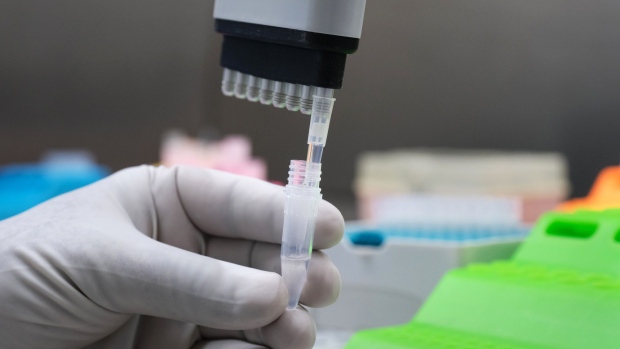Feb 18, 2021
Pandemic Stokes Interest in Gates-Backed Public Health Fund
, Bloomberg News

(Bloomberg) -- The coronavirus pandemic has shone a spotlight on underfunded public health issues and infectious diseases. Investors once reluctant to put capital toward niche vaccine candidates, diagnostic tools and other public health solutions are taking notice.
A venture capital firm launched by veterans of the Bill & Melinda Gates Foundation-sponsored Global Health Investment Fund has attracted $300 million in an oversubscribed fund to spur development of affordable technologies to address global health issues.
Adjuvant Capital drew a $75 million anchor investment from the Gates Foundation’s Strategic Investment Fund, as well as significant investment from large drugmakers Merck & Co. and Novartis AG, and such others as the International Finance Corporation and Dalio Philanthropies. The capital will be deployed across a portfolio of 14 companies, which are focused on a range of health issues including yellow fever, non-hormonal contraception and Covid-19.
When Glenn Rockman founded Adjuvant in 2019, he sought to raise a debut fund of $100 to $200 million. While much was raised in the months preceding the pandemic, “the popularity and importance of our model and the obvious interconnection between economic prosperity and public health became even clearer” as Covid-19 spread, Rockman said in an interview. “We had substantially more interest in the fund than we could accommodate.”
Fund-raising amid the pandemic has posed logistical challenges for the 10-person team, as investments from asset managers, financial institutions and foundations have been unstable amid economic volatility. When the markets stabilized, many doubled down on their previous commitments, Rockman said. Adjuvant, at the request of the Gates Foundation, ultimately capped the fund at $300 million. About half of that amount has already been committed across the portfolio.
Venture Funding
Drugmakers and life science-focused venture capital firms in recent years have placed big bets on cancer drugs, gene therapies and other treatments for rare diseases. Simultaneously, the industry has pulled away from vaccines, antivirals, antibiotics and women’s health. The World Health Organization and the United Nations have warned of the devastating impact of a lack of investment in these areas.
Read More: The Five Things to Get Right Before the Next Pandemic
“The pandemic has given us a silver lining,” said Jenny Yip, managing partner at Adjuvant. “The market is driven by individuals, at individual companies, making individual decisions. It’s personal. It took a pandemic coming on our shores to somehow recognize that vaccines can make for a very, very profitable venture.”
About one-third of Adjuvant’s portfolio is focused on vaccine development, which the firm sees as having the greatest impact on as public health. Yip said she’s also focused on supporting “manufacturing capacity and the not-so-sexy parts of vaccine production.”
Executives at Merck and Novartis said they were drawn to Adjuvant’s health equity-focused model.
“Especially in light of our experiences this last year, how do we really address these things that pop up on us?” said Carmen Villar, Merck’s vice president of social business innovation, who oversees the company’s foundation. “In a world with no real borders, anything can happen. Are we really ready?”
While Villar expects Merck to make good returns from Adjuvant’s fund, she also sees the potential for the company to collaborate within the portfolio. In fact, the drug giant has already acquired one of those companies.
One of Adjuvant’s earliest investments was in Themis Bioscience, an Austrian biotech company that held the rights to technology used in a measles shot in Europe. Last May, Merck acquired Themis, and sought to use the platform to develop a Covid-19 vaccine. Though the drug giant has since abandoned the candidate amid lackluster trial data, it still sees the potential for developing a shot to prevent chikungunya, a painful mosquito-borne viral disease.
Business Models
The pandemic may help shift the narrative about the limited profit potential in the public health arena, said Lutz Hegemann, Novartis’s chief operating officer for global health.
“Historically, we’ve looked at these areas as places where you make donations, but don’t have sustainable business models,” Hegemann said, describing that phenomenon as a “market failure.”
“This is changing,” he said. “We’ve been very active in trying to find the sustainability in these disease areas.”
While New York-based Adjuvant sees its portfolio providing value to investors beyond this pandemic, many wonder whether capital will continue to flock to global health issues.
“In the short term, there’s tremendous interest in investing in infectious disease, which is both good and bad,” said Natalie Revelle, who leads structured financing investments within Gates’ Strategic Investment Fund. “There’s a question as to whether or not this interest is sustained in the medium to long term.”
“If we get crowded out of the fund one day,” she said, “that would be a success.”
©2021 Bloomberg L.P.